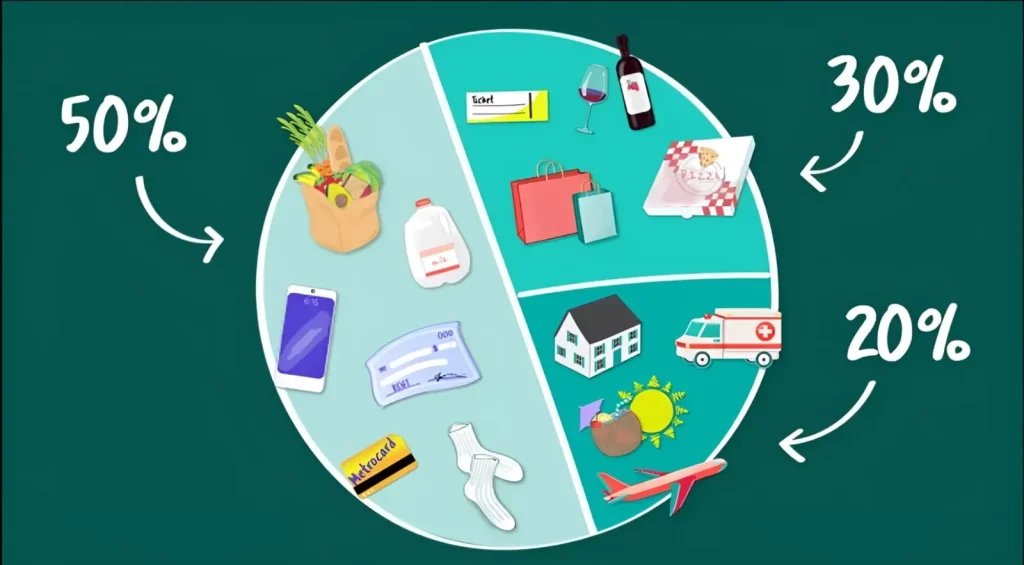
Table of Content
Money-holding skills are the key to maintaining financial stability, even if your income is only average. In big cities, many people earning 8 million VND per month believe it’s just enough to cover daily expenses, leaving nothing to save. However, reality shows that if you develop this skill, you can still set aside a decent amount every month. Holding onto money is not just about cutting spending—it’s the art of smart financial management and discipline.
The 50/30/20 Rule – A Beginner’s Lesson in Money-Holding Skills

One of the most effective personal finance methods is the 50/30/20 rule:
- 50% of income (around 4 million VND) goes to essentials such as food, rent, utilities, and transportation.
- 30% of income (about 2.4 million VND) is for personal needs and entertainment.
- 20% of income (about 1.6 million VND) is dedicated to savings and investments.
This allocation helps you live comfortably while building a solid foundation for your money-holding skills.
Tracking Expenses – A Small Habit with Big Results
Many people earning 8 million VND fail to save simply because they don’t know where their money goes. By downloading an expense-tracking app or writing in a notebook, you’ll be surprised to see how small amounts spent on coffee, food delivery, or online shopping add up.
Studies show that just by tracking expenses, you can save an additional 10–15% of your income every month. This is the first step in developing strong money-holding skills.
Smart Eating – Saving Money from the Kitchen

Food expenses often take up a big part of the budget, especially for city dwellers. Without control, it can consume nearly half your income. To improve money-holding skills, you can:
- Cook at home at least 3–4 times per week: this not only saves money but also improves health. Many people reduce their food costs by 20–30% after maintaining this habit for a few months.
- Prepare lunch to bring to work: instead of paying 40,000–50,000 VND per meal outside, you can prepare one for 20,000–25,000 VND, saving 1–1.5 million VND per month.
- Plan grocery shopping weekly: stick to a list, take advantage of promotions, and avoid impulsive purchases—an essential trick for training money-holding skills.
For example, a friend of mine, who earns 8 million VND, used to spend 3.5 million per month on eating out. After switching to cooking at home and preparing lunch, the cost dropped to 2 million, allowing her to save 1.5 million monthly—equivalent to 18 million a year. This proves that money-holding skills are not about living in extreme frugality, but about smart and scientific spending.
Optimizing Transportation Costs – A Crucial Part of Money-Holding Skills
If your workplace is close, walking or cycling can save money while improving health. For motorbike users, regular maintenance prevents costly repairs. Public transport such as buses or metro is also a smart choice, saving on fuel and parking while ensuring safety.
Controlling Emotional Spending
One of the biggest enemies of money-holding skills is emotional shopping. People often buy items they don’t truly need just because they’re “on sale” or “look nice.” To avoid this trap, apply the 24-hour rule: only buy something after you’ve thought about it for a day and still feel it’s necessary.
Turning Idle Money into Assets

Money-holding skills are not just about saving but also about making money grow. With just 1–2 million VND saved monthly, you can:
- Open an online savings account with safe interest.
- Join mutual funds with small investments.
- Use reliable financial apps offering 6–8% annual returns.
The key is consistency, not the amount. Saving 1.5 million per month for two years adds up to more than 36 million, enough for bigger goals like upgrading skills or long-term investments.
When your main income is limited, finding side jobs is also an option. Writing content, translation, online sales, or tutoring can all generate extra money. This additional income not only makes life more comfortable but also strengthens your money-holding skills.
Discipline and Positive Mindset – The Core of Money-Holding Skills
Discipline is the foundation of money-holding skills. Even the most detailed financial plan will collapse without consistency. Saving money requires daily discipline and regular action.
Instead of setting goals too far out of reach, start with realistic milestones: save at least 1.5 million per month, accumulate 20 million after one year, and after three years, have enough to invest in new skills, personal development, or essential purchases. Once this habit is maintained continuously, saving and financial management will become natural rather than forced.
In addition to discipline, mindset plays an equally important role. Many people fail not because they don’t earn enough but because they make their lives overly restrictive, eventually giving up. Holding money doesn’t mean eliminating all pleasures. It means finding balance: allocate a portion for enjoyment while consistently saving. When you feel comfortable with your financial plan, money-holding becomes a sustainable lifestyle. The combination of discipline and positivity is the key to maintaining long-term money-holding skills and moving closer to financial freedom.
Conclusion
With an income of 8 million VND, what matters most is not how much you earn, but how you hold onto your money. By applying the 50/30/20 rule, tracking expenses, saving from meals, controlling emotional spending, and making small investments, you can live comfortably and still save regularly.
Remember: money-holding skills are the foundation for financial freedom. Once mastered, even if your income grows to 10 million, 20 million, or more, you’ll know how to turn money into real assets.

















